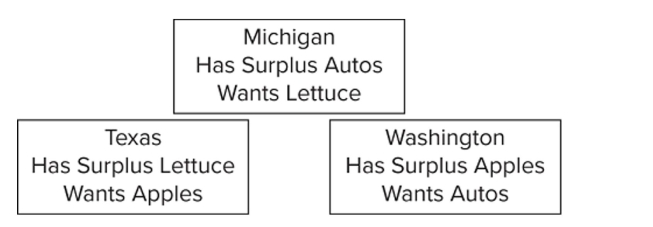Exam 2: The Market System and the Circular Flow
Exam 2: The Market System and the Circular Flow274 Questions
Exam 3: Demand, Supply, and Market Equilibrium357 Questions
Exam 4: Market Failures Caused by Externalities Asymmetric Information222 Questions
Exam 5: Public Goods, Public Choice, and Government Failure242 Questions
Exam 6: An Introduction to Macroeconomics243 Questions
Exam 7: Measuring Domestic Output and National Income238 Questions
Exam 8: Economic Growth274 Questions
Exam 9: Business Cycles, Unemployment, and Inflation298 Questions
Exam 10: Basic Macroeconomic Relationships233 Questions
Exam 11: The Aggregate Expenditures Model126 Questions
Exam 12: Aggregate Demand and Aggregate Supply320 Questions
Exam 13: Fiscal Policy, Deficits, and Debt401 Questions
Exam 14: Money, Banking, and Financial Institutions265 Questions
Exam 15: Money Creation285 Questions
Exam 16: Interest Rates and Monetary Policy405 Questions
Exam 17: Financial Economics356 Questions
Exam 18: Extending the Analysis of Aggregate Supply268 Questions
Exam 19: Current Issues in Macro Theory and Policy279 Questions
Exam 20: International Trade339 Questions
Exam 21: The Balance of Payments, Exchange Rates, and Trade Deficits315 Questions
Exam 22: The Economics of Developing Countries269 Questions
Select questions type
What is the relationship between businesses and households in the circular flow diagram?
(Essay)
4.9/5  (38)
(38)
A corporation is a type of business firm where the debt of the firm is considered its owners' personal
responsibility.
(True/False)
5.0/5  (38)
(38)
One basic problem faced by central planners, but hardly present in a market system, has to do with
(Multiple Choice)
4.9/5  (34)
(34)
In what type of business do the owners bear no personal financial responsibility for the company's debts and obligations?
(Multiple Choice)
4.8/5  (39)
(39)
In a market system, as one industry expands while another contracts, resources will flow
(Multiple Choice)
4.8/5  (27)
(27)
Which of the following is not a typical characteristic of a market system?
(Multiple Choice)
4.8/5  (29)
(29)
The concept of consumer sovereignty refers to the situation where consumers have the right to vote for
the board of directors of large corporations.
(True/False)
4.9/5  (32)
(32)
The coordination problem in the centrally planned economies refers to the idea that
(Multiple Choice)
4.9/5  (38)
(38)
In a market system, if firms in an industry persistently earn total revenues that are less than total costs, then that industry will
(Multiple Choice)
4.8/5  (40)
(40)
If a competitive industry is neither expanding nor contracting, we would expect
(Multiple Choice)
5.0/5  (36)
(36)
Having a high fixed salary is what motivates entrepreneurs to make prudent decisions in dealing with
business risk.
(True/False)
4.8/5  (25)
(25)
How does human specialization contribute toward increasing an economy's output?
(Multiple Choice)
4.9/5  (44)
(44)
In a command economy like the old Soviet Union, one is able to improve one's lot and get ahead in society largely through
(Multiple Choice)
4.8/5  (44)
(44)
Capitalism gets its name from the fact that capital resources are mostly
(Multiple Choice)
4.8/5  (33)
(33)
 Given the information, and assuming trade occurs between the three states, we can expect
Given the information, and assuming trade occurs between the three states, we can expect
(Multiple Choice)
4.8/5  (44)
(44)
Why might a company use barter rather than money to make a trade?
(Multiple Choice)
4.9/5  (34)
(34)
Showing 201 - 220 of 274
Filters
- Essay(0)
- Multiple Choice(0)
- Short Answer(0)
- True False(0)
- Matching(0)